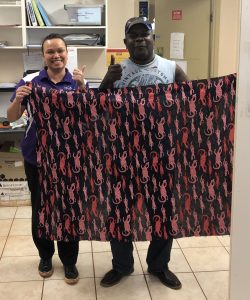Speaking to Kristal early last week, we were able to chat and get more of an understanding of why she is so passionate about the health care of First Nations people.
Admittedly, Kristal was not always focused on becoming a nurse.
“I was a new, young solo parent, and I felt that I had limited prospects. I had failed school, and I didn’t get into the Army or the police force like I wanted. In short, if I hadn’t tried to donate blood and been told by the Blood Bank nurse that I would make a good nurse, I wouldn’t have tried out nursing. I’m glad that I did give nursing a shot. To be honest, I didn’t think I would get through my first year, let alone go on to do more studies and have as many nursing adventures as I have!”
Discussing cultural differences that medical professionals should be aware of, Kristal explained that each First Nations peoples may practice their culture differently.
“You cannot make assumptions. Culture is different, yet similar in some ways. Each person will practice their culture individually. For example, in some communities making eye contact is considered confrontational and disrespectful, whereas for other First Nations peoples, they will hold eye contact as they know that in Western culture it is considered rude not to hold eye contact.”
Some First Nations peoples may feel out of place, especially if they are from rural and remote areas. It could be the person’s first time in a hospital, in a city, they may not have any support people in that location, and or may distrust medical settings. It is important that health professionals are aware of how they may be feeling.
“We recently had a young man come in for treatment; he had never stepped foot into a city before, let alone a hospital. It would have been a big culture shock and a very scary experience for him.”
Kristal expressed that there are many things that can be done to make sure that Aboriginal and Torres Strait Islander peoples have a positive experience when accessing services.
“We can make such a difference between First Nations peoples having a good experience and having a very negative experience. A negative experience may prevent First Nations people from coming to the hospital and accessing medical treatments.
Healthcare professionals can contact their Aboriginal Liaison Officer, link in linguistics communicators or family members, and look up resource material. Printed materials that are culturally appropriately designed and include pictures are useful as the patient can refer to materials when they return home”.
“As an Aboriginal nurse, I assess the patient based on if English is a first, second or third language, education levels, and exposure to medical settings before talking about the diagnosis’ and will use pictures to help develop their understanding of the medical condition, treatment and care to help enhance informed consent”.
Kristal has worked in many different settings and in many different industries (speaking at universities, completing research, working in mining & construction and many other roles). But she has made sure that she has learnt something from every cultural experience.
“Every single role I’ve gone into, I’ve made sure to learn something about the community, the people and their cultures to help to help improve and enhance my nursing practice”.
Kristal emphasised that “learning about First Nations cultures is essential to providing good, culturally safe care and treatment. It cannot be achieved through one cultural competency or awareness training program; it is a lifelong journey and requires to be started each time you work in a new community; you should make an effort to learn about the local cultures.”
We thank Kristal for telling her story and for providing education about health and community care for Aboriginal and Torres Strait Islander peoples.

(Pictured: Kristal (left) and Samuel Daylight (right). Samuel is a Minyerri Elder & Magpie Goose Artist)

